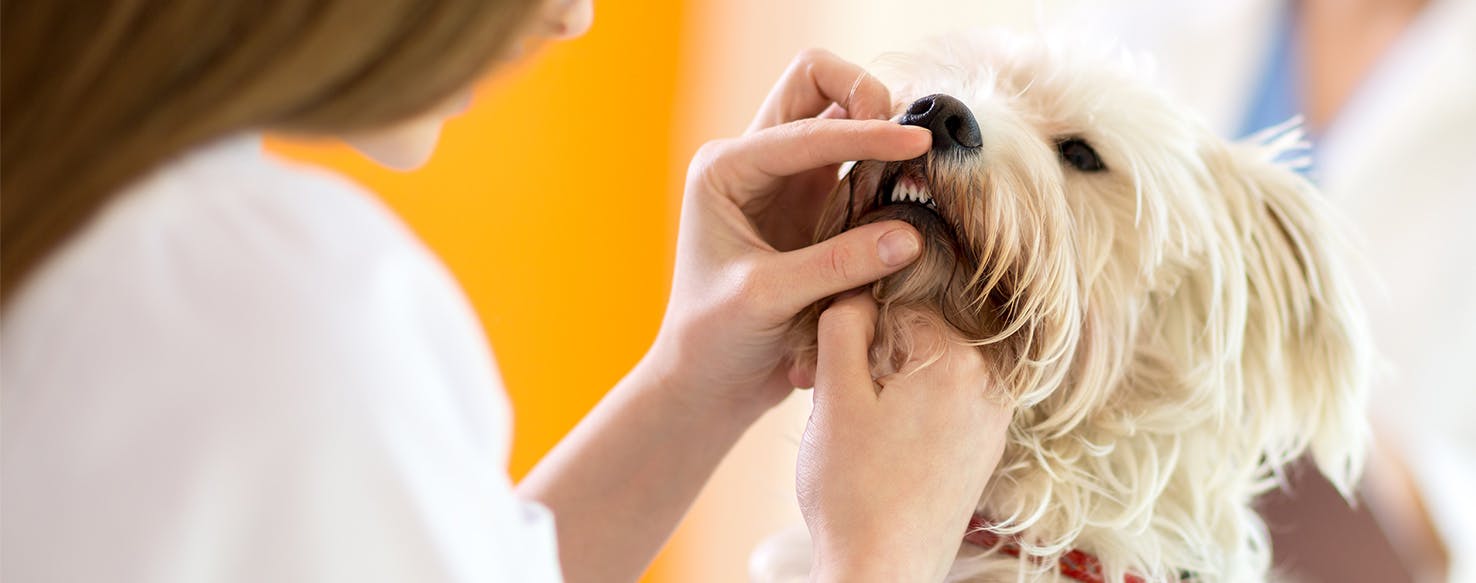
By Darlene Stott
Published: 07/13/2017, edited: 09/07/2022
Save on pet insurance for your pet
You don't have to choose between your pet and your wallet when it comes to expensive vet visits. Prepare ahead of time for unexpected vet bills by finding the pawfect pet insurance.
You’ve seen them. The dogs with teeth so out of control you don’t know how it’s even possible for the pooch to eat. Though these dogs might end up in an ugly dog competition where the winner is chosen truly because the dog is so ugly they are cute, having orthodontia issues in your dog’s mouth can be a real problem. One you might need to talk to your veterinarian about. People often get braces on their pearly whites to straighten the teeth and also to improve oral and overall health. If your dog is having a difficult time eating or has teeth that cause additional problems, can your dog get braces?
Can Dogs Get Braces?
YES!
Many breeds typically have odd teeth, whether it be overbites, underbites, or crooked teeth making it difficult to close their mouths or chew. If your dog has teeth that hit other teeth or soft tissue when they chew or bark, your veterinarian can advise you on braces for your dog. Though some veterinarians may suggest pulling the obtrusive teeth, if your dog is still young and the affected teeth are necessary for the years to come, your vet might instead suggest putting braces on your dog’s teeth to correct the alignment, giving your furry buddy better overall health.
Does My Dog Need Braces?
Many breeds with short faces or shorter snouts have teeth protruding from their jaw. This is typical of the breed; it shouldn’t be a problem with your dog unless those teeth are painful or hitting other teeth or soft tissue.
Your dog may have experienced trauma pushing the teeth into new spaces that are not conducive to proper eating and possibly painful for your pup within the new location. If your dog’s other teeth are affected by a new positioning of existing teeth such as tooth striking tooth, braces might be able to reposition the teeth.
If your dog does not have a proper scissor bite where the top teeth fill in the gaps between the bottom teeth and has stopped eating because of discomfort or pain, braces may resolve the problem. Dogs who have stopped eating because of mouth pain should be seen by your veterinarian for a complete diagnosis. If your dog’s teeth line up improperly, they could be hitting other teeth, causing cracks or hitting the soft palate and causing pain for your dog.
A candidate for braces would have teeth that do not align properly, causing pain or possible breakage to gum tissue or other teeth.
How Do I Treat My Dog’s Teeth with Braces?
Your veterinarian will advise you on treatment for your dog if braces are necessary and would benefit your dog. If your dog requires braces, there may be several options to choose including plates in the mouth, bands, or braces. Because dogs’ mouths vary in shape and size, your dog may end up with an orthodontic device that looks different or very similar to braces people get.
Your veterinarian will determine how long the braces will be on and when and if adjusting will occur. Braces could move your dog’s problem teeth into a place more comfortable and more natural while eliminating pain and discomfort. Your four-legged buddy may have braces for six to twelve months before their teeth are in place and the braces are removed.
How Are Braces Similar in Dogs and Humans?
The mouths of dogs are shaped differently from a person’s mouth, and various breeds’ mouths differ within the species. This can make it more difficult to ascertain the dental issues and create an effective treatment. But humans and dogs who need braces do have some similarities:
-
Teeth in improper order
-
Teeth not lined up correctly
-
A bite which causes teeth to strike one another
-
A bite which causes teeth to strike soft tissue
-
Trauma moving teeth out of place
How Are Braces Different in Dogs and Humans?
Your veterinarian will decide if braces are not only an appropriate treatment for your dog’s bite and alignment of teeth, but they will also decide if braces for your dog are ethical and necessary. Unlike for humans, your veterinarian will not put braces on your dog’s teeth unless it is medically necessary to improve pain, discomfort, or move teeth from a position where they have been rendered useless. Your veterinarian will not use braces for many of the same reasons humans wear braces. Your dog will not be getting braces for the following conditions:
-
Cosmetic reasons
-
Teeth do not align properly but are not causing pain or eating issues
-
Any time pulling teeth would be more beneficial to the dog
-
Any time the veterinarian deems it unethical
-
For any reason that does not improve the dog’s overall health
Case Study
One veterinarian explained why he chose to put braces on his own puppy because the puppy, at six months of age, couldn’t properly bite down. The puppy had stopped eating and was losing weight. Because this case was recent, this puppy got a lot of media attention and brought to light the role braces can have on improving dog’s health.
Considering braces for your pet? Most pet insurance companies offer wellness add-ons that cover the cost of natural supplements and preventative care. Start shopping around for pet insurance today to find the “pawfect” option for your fur-baby.
You may also like
